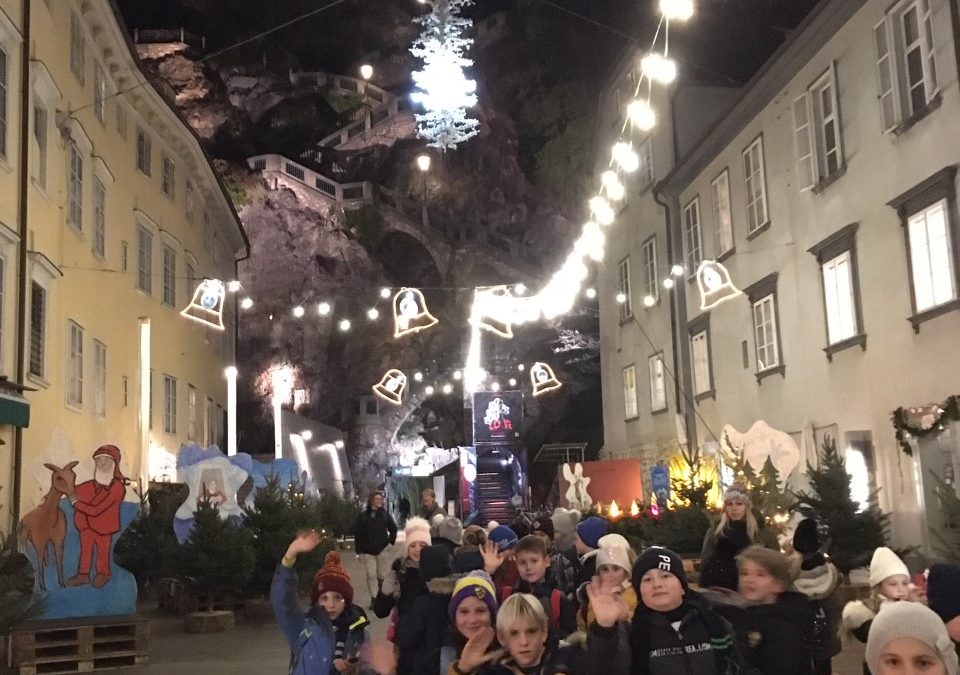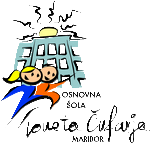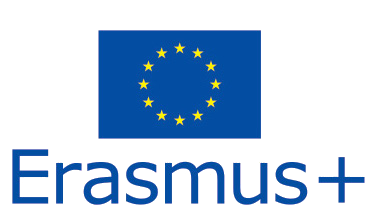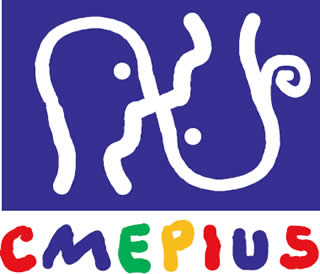- Projekti
- Graz trifft Marburg – Marburg trifft Graz - KA229
- O šoli
- About school - ENG
- HAPHC: The Health and Academic Performance with Happy Children
- spoznavanje naravnih in kulturnih znamenitosti domačega kraja,
- okrepljena samoiniciativnost, podjetnost,
- razvijanje jezikovnih spretnosti tujih jezikov,
- razumevanje družbene in etične raznolikosti,
- okrepljena motivacija in zadovoljstvo pri delu,
- izmenjava delovnih izkušenj in primerov dobrih praks,
- spoznavanje našega šolskega sistema, načina poučevanja in vodenja,
- opazovanje dela v razredu in splošne šolske klime,
- širitev sodelovanja z ostalimi šolami držav članic EU,
- navezava stikov s kolegi iz drugih držav in nadaljevanje sodelovanja v sklopu Erasmus+ projektov (KA2),
- spodbujanje družbene, državljanske in medkulturne kompetence.
Koordinatorica projekta je Sara Menard.
- različni projekti v okviru E-twinninga;
- prijava na Erasmus+ K1 mobilnosti – 2016 – 2019;
- prijava na Erasmus+ K2 strateška partnerstva – 2018;
- aktivno sodelovanje z vsaj eno šolo iz Srbije – začetek 2016.
- izboljšati znanje tujih jezikov strokovnih in vodstvenih delavcev;
- spoznati šolske politike in sisteme v drugih evropskih državah in le-to kakovostno in kritično vnašati v načine dela in potrebne izboljšave pri organizaciji dela na naši šoli;
- s pomočjo znanj in kompetenc pridobljenih na tečajih in študijskih obiskih izboljšati kompetence strokovnih in vodstvenih delavcev na področju poučevanja (aktivne metode dela, dvig ravni bralne pismenosti, formativno spremljanje) in drugega dela z mladimi;
- omogočiti boljše razumevanje družbene, jezikovne in kulturne raznolikosti v Evropi in le-to v čim večji meri vpletati v svoje delo z učenci;
- povečati motivacijo zaposlenih za nove in drugačne načine poučevanja in dela z mladimi;
- poiskati možnosti za nadaljnje sodelovanje v okviru K2 strateških partnerstev s pomočjo katerih bomo lahko omogočili mobilnost učencev in s tem tudi učencem omogočili pridobivanje ali izboljšanje nekaterih kompetenc predvsem kompetence sporazumevanja v tujem jeziku, razumevanja družbene, jezikovne in kulturne raznolikosti Evrope ter spoznavanja Evropske dimenzije in priložnosti, ki jo le ta ponuja pri njihovi nadaljnji poklicni poti.
The Primary school Toneta Čufarja Maribor has almost 120 years of tradition. It has a significant position in Primary education in Maribor and Slovenia if we consider the devoted work habits and constant professional development of its employees who cooperate with various national institutions (National Education Institute Slovenia, National School for Leadership in Education, Ministry of Education, Science and Sport, National Sport Institute Planica, Slovene Human Resources Development and Scholarship Fund). In the last years, we have been focusing on the quality of learning and teaching, on integrating educational ICT and its critical use in school or at home. We have been developing basic values and have tried to offer quality extracurricular activities such as sports, creative activities, activities of learning foreign languages, developing the mathematical or linguistic literacy etc. We care for the socially and culturally more vulnerable groups (pupils with special needs, Romany people, immigrants, pupils with socially weak status). In the last years the school’s leadership and staff have felt that our knowledge and abilities as teachers can be improved by means of international cooperation. This would improve the knowledge and competence of our pupils as well. We have included the international cooperation in our Development plan for the period 2015-2020. In the next five years, we plan to cooperate internationally as follows:
- Various projects in eTwinning
- Applying for Erasmus+ K1 mobility for 2016-2019
- Applying for Erasmus+ K2 strategic partnership in 2017
- Active collaboration with at least one school in Serbia – beginning in 2016
First steps have already been taken (first projects in eTwinning and with the Serbian school, first K1 mobilities in 2016/17). We would like to continue with K1 mobilities in 2017-2019 in order to:
- Perform job shadowing in English speaking countries, with special interest in formative assessment;
- Continue improving school staff’s foreign languages competences;
- get to know and exchange information about education systems and use the new knowledge to improve the organisation of work in our school;
- use the knowledge and competences gained, to improve our pedagogical work (active methods of teaching, language literacy, formative assessment) and other activities done with pupils;
- better understand social, linguistic and cultural diversity of Europe and incorporate this as much as possible in our work with pupils;
- motivate our employees for new and different ways of teaching and working with pupils;
- find opportunities for further collaboration in terms of K1 (job shadowing, teaching) and K2 strategic partnership (mobility of pupils). K2 would enable our pupils to gain or/ and improve foreign language competences, understand the social, linguistic and cultural diversity of Europe and to get to know the European dimensions and opportunities they have in their further career path.
We expect that the cooperation in this programme will motivate our school and open more possibilities for international cooperation in the future in order to include our pupils and other school’s staff in the programme and broaden our horizons, as well as strengthen pupils’ competences, which they will need for continuing their schooling (education), work and living in Europe.
HAPCH: Health & academic performance with happy children
Trajanje projekta: 1. 9. 2020 – 31. 8. 2023
Vodja projekta: ALMA MATER EUROPEA
Financer: Erasmus+, KA2 Strateška partnerstva
Kratka vsebina projekta:
Namen projekta HAPHC (strateško partnerstvo) je prenos norveškega modela izvajanja pedagoške oblike učenja s telesno dejavnostjo/gibalno aktivnostjo na vzorec 4000 učencev iz osnovnih šol v Sloveniji, Avstriji in Belgiji. Učenci bodo povečali svojo telesno aktivnost v vsakdanjem šolskem življenju za eno uro vsak dan. Poleg tega bodo vzdrževali običajne dve uri telesne vadbe na teden in aktivnost, ki jih imajo v prostem času. Dobre prehranjevalne navade se oblikujejo zgodaj, starši pa imajo pri tem najpomembnejši vpliv. Učinek spremembe prehranjevalnih navad bo izmerjen z vprašalnikom. Poleg promocije telesne dejavnosti, aktivnega in zdravega življenjskega sloga, opozarjanje na negativne učinke sedetranega vedenja ipd. bodo učenci deležni še aktivnega učenja pri šolskih predmetih, kot so slovenščina, matematika, spoznavanje okolja idr.. Splošni namem projekta HAPHC je raziskati učinek novega pedagoškega pristopa, ki pri poučevanju vključuje telesno dejavnost/gibalno aktivnost med šolskim kurikulumom na posamezne komponente telesne prirpavljenosti kot je telesna sestava, aerobna zmogljivost, telesna zmogljivost, mišična moč idr. ter ocenjevanje funkcijske spsoobnosti (kognitivne itd.) ter akadeemske uspešnosti (akademske kompetence), kakovost življenja osnovnošolskih otrok. Glavni namen meritev ocenjevanja učinkov intervencije (gibalna aktivnost med poukom), ki jih bodo izvajali magistrski in dodiplomski študentje fizioterapije pod mentorstvom visokošolskih učiteljev s podorčja fizioterapijeje, ugotovitev učinkov posega na področja, kot so kakovost življenja, fiziologija, kognicija in akademska uspešnost.
The Health and Academic Performance with Happy Children (HAPHC) study aims to improve learning as well as promote health and integrate the physical activity into regular curricula through internationally and transculturally transferable PAAC materials and procedures developed in HAPHC project. By replacing theoretical activities with a school-based physical activity program within the curriculum (PAAC) the children will attend PA while learning their curriculum. Using schools as an intervention arena reaches all socioeconomic layers with the potential of reducing inequality in health. Specifically, the project will evaluate the effects of a large scale longitudinal intervention. The focus is the following thematic areas, i)learning and cognition, ii) nutrition and growth, including obesity, iii) physical activity and physical health, iv) mental health and quality of life. Both gender pupils will perform the same PAAC learning through the project. This will empower girls and boys from different socio-economic, cultural and health status settings and contexts to perform physical activity while learning. About equal number of women and men are represented among the research and teaching staff. This application adheres well to the Erasmus+ program plan’s main aim to improve public health, quality of life and reduce social and cultural inequality in health. HAPHC emphasizes the prioritized thematic areas given in the call for development, implementation and evaluation the effect of health promoting and academic enhancement. The aim is to promote public health within physical activity, inactivity, diet and prevention of non-communicable diseases among children throughout elementary schools. The project includes partners from different sectors, such as academia, municipality and public health service and thereby creates a cross-sectional collaborative network of highly skilled expertise in an Pan-European study. The intervention holds the potential for implementation at an international level based on scientific evidence, and the project as a whole will additionally provide important knowledge to the literature. HAPHC will focus on a new pedagogical approach, PAAC, on a large scale implementation in elementary schools across four European countries: Norway, Austria, Slovenia and Belgium. some schools have been selected and recruited in preparation phase and are already part of the consortium. There is a global need for public efforts to halt the increasing prevalence of overweight and obesity among children as well as other non-communicable diseases. This study will draw attention from policy makers, media, teachers, parents and children to improve and promote better health among children in Europe. There is a need to promote health at an early age to provide the best possibilities to each individual for a healthy and productive life, as well as for society to have healthy, hardworking citizens that may contribute to building society. There is also the need to change the sedentary learning practices that are not giving best learning and health results. The study’s thematic areas allow the investigation of different factors relation to learning as well as the others secondary health outcomes. Mental health among children and adolescents has for good reason been put high on the political agenda though its important role for future health and productivity.
This project is in accordance with the need for population-based longitudinal research on mental health, including assessment of risk factors that have the potential to be strengthened or changed to inform intervention strategies designed to promote positive development and well-being in children and integration among children. Also, the study evaluates possible effects on mental health from a school based longitudinal intervention. The study brings together academics from different fields and countries of medical and health science, as well as in education fields, in a multidisciplinary study to mutual benefit. Based on the experience from the HOPP-study, transfer of knowledge as to how to educate children in a more fun and intuitive is one of the fundamental plans in the project. The positive effects on children should be implemented in universities and colleges who educate teachers in all grades. A teacher is already an educater and an upbringer of children, learning them to behave take care of themselves in a coalision with parents. Including a health related dimension to teaching, not only as an oral transfer of information, but an active part of a health promoting program for children seem as a natural next step against the existing and future health problems. All this without giving poorer education. The current project aims to, along with the PAAC to children, establish educational program and practice for teachers and universities which would like to learn more about the program and incorporate it into the curriculum for teachers at an university level.
Kontakt: Projekta pisarna AMEU: tel. št.: 059 333 075 ali email: anja.inkret@almamater.si
Koordinatorica projekta: Živa Podbevšek
Erasmus+ – potujemo, raziskujemo, sklepamo prijateljstva
Letošnje šolsko leto je bilo na področju mednarodnega sodelovanja pestro in zanimivo. Sodelovali smo s partnerskima šolama iz Španije, s katerima smo se dogovorili za mobilnosti učencev in učiteljev. Učenci sedmih razredov so skozi celotno šolsko leto spoznavali...
Z Erasmusom v Graz
Te dni so učenci 5. razredov na obisku partnerske šole Volksschule Graz-Triester v Grazu. Obisk smo izvedli v okviru mednarodnega projekta Erasmus+, ki šoli omogoča mobilnosti učencev in učiteljev v države članice Evropske unije. Učenci v obisku neizmerno uživajo....
Obiskali so nas učenci Folk Schule VS Triester iz Graza
V četrtek, 29. 9. 2022, so učenci petih razredov dobili poseben obisk. V okviru mednarodnega projekta Erasmus+ so jih obiskali vrstniki iz Graza. Obisk je bil namenjen spoznavanju in povezovanju učencev, predstavitvi šole ter kulturnih, zgodovinskih znamenitosti...
Obeležili smo evropski dan jezikov
V ponedeljek, 26. 9. 2022, smo z učenci 2.b razreda obeležili evropski dan jezikov. K sodelovanju so nas prijazno povabili predšolski otroci in učiteljici bolgarskega vrtca Valentina Tereshkova iz Varne, s katerim smo se povezali preko mednarodnega projekta Erasmus+....

Utrinki iz Graza 2019

Graz ’19 – obvestilo pred odhodom
V spodnjih vrsticah prilagam navodila za ekskurzijo nemščine (3. – 4. razreda), ki bo v torek, 10.decembra, 2019. PROSIM NE POZABITE NA: veljaven osebni dokument, TOČEN ZNESEK 8,50€ ZA PLAČILO LUTKOVNE PREDSTAVE, primerna oblačila in obutev, ter kakšen sendvič in...

”Božična želja” in Advent v Grazu
Dragi starši in učenci! V teku so priprave na strokovno ekskurzijo nemščine v Gradec, namenjeno učencem od 3. – 5. razreda, predvideno za torek, 10.12.2019. Po pouku in kosilu se bomo okoli 14.30 zapeljali do Gradca. Ogledali si bomo lutkovno predstavo ''Kasperl-ova...
4. srečanje četrtošolcev v okviru mednarodnega projekta Erasmus+ KA229 »Graz trifft Marburg, Marburg trifft Graz«.
*Most prijateljstva* V četrtek, 10. 10. 2019, so naši učenci četrtih razredov v okviru mednarodnega projekta Erasmus+ KA229 »Graz trifft Maribor, Maribor trifft Graz« imeli 4. srečanje z učenci četrtih razredov OŠ Schönau iz Gradca. Srečanje se je pričelo v Pavlovi...
4. srečanje četrtošolcev v okviru mednarodnega projekta Erasmus+ KA229 »Graz trifft Marburg, Marburg trifft Graz«.
V četrtek, 10. 10. 2019, bo potekalo srečanje četrtošolcev OŠ Toneta Čufarja Maribor in OŠ Schönau iz Gradca v Avstriji. Srečanje bo potekalo v Pavlovi hiši v Gornji Radgoni (Bad Radkersburg, Avstrija). Odhod izpred šole bo ob 8.20. Od 9.00 naprej so načrtovane...
2. srečanje tretješolcev z učenci OŠ Schönau Graz.
V sredo, 15.5.2019, smo se s tretješolci OŠ Toneta Čufarja Maribor v okviru mednarodnega projekta KA229 (»Graz trifft Marburg, Marburg trifft Graz) odpravili na 2. srečanje z učenci tretjih razredov OŠ Schönau Graz. Pričakali so nas v avli njihove osnovne šole. Po...




